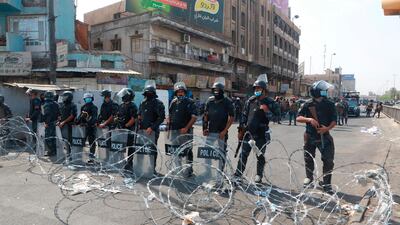Iraqi Prime Minister Adel Abdel Mahdi has announced a government reshuffle in his latest attempt to quell mass demonstrations and a continued crackdown that has killed over 100 people.
Mr Abdul Mahdi told a news conference in Baghdad that he will shortly present a list of new ministers for parliament for approval. He said the government will refer hundreds of government officials to the judiciary to investigate for corruption.
But the largest bloc in parliament owes allegiance to a militia grouping armed by Iran and corruption in the system as a whole was a main reason behind the demonstrations breaking out this month, demanding the removal of the political class.
At least 110 people were killed in the demonstrations, which erupted in central and southern Iraq earlier this month and were met by live fire by the authorities, with pro-Iranian militia targeting the protesters as well, activists and protesters said.
Earlier this week Mr Abdul Mahdi released a jobs, training and welfare plan. But the move has been widely regarded as too little, too late and is unlikely to ease public anger.
He posted the reform ideas on social media after a cabinet meeting despite the authorities cutting off the internet and disrupting cell phone networks.
The US Secretary of State, Mike Pompeo, has called on Mr Abdul Mahdi to limit the bloodshed.
In a call with Mr Abdul Mahdi, Mr Pompeo “lamented the tragic loss of life over the past few days and urged the Iraqi government to exercise maximum restraint", the State Department said.
Mr Pompeo urged him "to take immediate steps to address the protesters' grievances by enacting reforms and tackling corruption".
Amnesty International said in an initial report on Wednesday's events that the “Iraqi authorities’ brazen use of excessive and lethal force against protesters in Baghdad and elsewhere must not be allowed to be swept under the rug.”
Amnesty International said journalists and activists reported receiving threats from security forces telling them to remain silent and that arbitrary arrests abounded.
The organisation quoted witnesses in Baghdad, Diwaniya and Najaf saying security forces arrested hundreds of protesters, “often chasing them into side streets amid the chaos of people running away from tear gas and live ammunition”.
Lynn Maalouf, Middle East research director at Amnesty said the government’s promises of reform “will simply not fly when Iraqis continue to be threatened into silence, arrested, and killed in the streets.”
The Iraqi authorities. Ms Maalouf said, must hold the security forces accountable for the killings and “unconditionally release all those detained solely for peacefully exercising their rights to protest and freedom of expression.”

